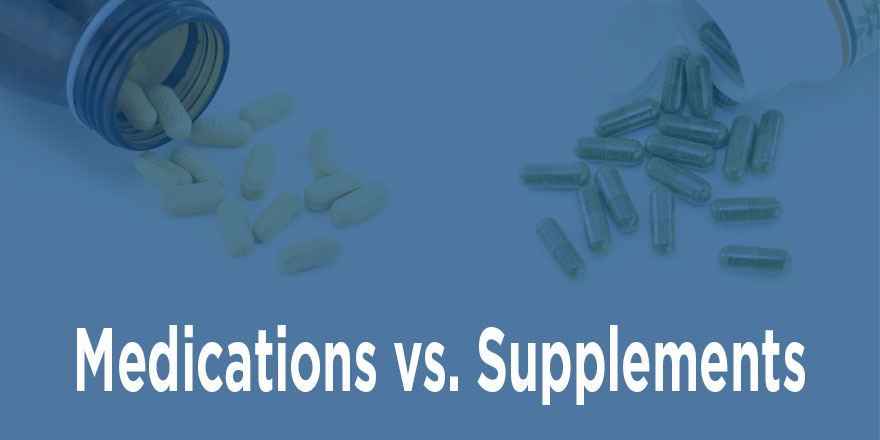Hey there! Have you ever wondered if supplements can replace medications or medical treatments? It’s a common question, and one that we’re going to explore in this article. We’ll take a look at the role supplements play in our health and whether they can be an alternative to traditional medications or treatments.
While we can’t give you a definitive answer right here, right now, we can certainly provide you with some valuable information to help you make an informed decision. We’ll delve into the benefits and limitations of supplements, as well as their potential interactions with medications. We’ll also explore some common conditions where supplements are commonly used as complementary or alternative therapies. So if you’re curious about the world of supplements and how they fit into the bigger picture of healthcare, stay tuned for the rest of the article. You’re sure to learn a thing or two!

This image is property of images.firstpost.com.
Introduction
Supplements and medications play important roles in maintaining and improving our overall health. While medications are commonly prescribed by healthcare professionals to treat specific medical conditions, supplements are often seen as natural alternatives that can support our well-being. In this article, we will explore the differences between supplements and medications, their benefits, limitations, and the importance of taking a collaborative approach when it comes to our health.
Understanding Supplements
What are supplements?
Supplements are products that are taken orally and contain essential nutrients such as vitamins, minerals, herbs, enzymes, or other dietary substances. They are designed to supplement our diet and provide nutrients that may not be obtained in sufficient quantities from food alone. Common supplements include multivitamins, fish oil, probiotics, and herbal supplements.
Different types of supplements
Supplements can be categorized into various types based on their intended purpose. Some supplements aim to fill in nutrient gaps in our diet, while others may claim to improve specific health conditions or enhance performance. Examples of different types of supplements include vitamin and mineral supplements, bodybuilding supplements, weight loss supplements, and herbal supplements.
How supplements work
Supplements work by providing our bodies with additional nutrients that may be lacking or in need of support. Depending on the type of supplement, they may help support our immune system, boost energy levels, promote healthy digestion, improve brain function, or support other specific bodily functions. While supplements are not intended to replace medications or medical treatments, they are often used as complementary approaches to support overall health.
This image is property of www.pennmedicine.org.
Role of Medications
What are medications?
Medications, also known as drugs or pharmaceuticals, are substances that are used to diagnose, prevent, treat, or cure diseases or medical conditions. Medications are carefully formulated and undergo rigorous testing and research before they are approved for use. They can be prescribed by healthcare professionals and are regulated by authorities to ensure their safety and efficacy.
Different types of medications
There are various types of medications available, each with its own specific purpose. Some common types of medications include antibiotics to treat bacterial infections, analgesics for pain relief, antihypertensives for high blood pressure, and antidepressants for mental health conditions. Medications can be taken orally, applied topically, injected, or delivered through other forms such as inhalers or patches.
How medications work
Medications work by targeting specific biological pathways or physiological processes in our bodies. They may block or enhance certain chemical reactions, inhibit the growth of pathogens, reduce inflammation, regulate hormone levels, or restore proper functioning of organs or systems. Medications are designed to directly target the cause or symptoms of a medical condition and are often crucial in managing and treating various diseases.
Comparison between Supplements and Medications
Efficacy and safety
Supplements and medications differ in terms of their efficacy and safety. Medications undergo extensive research, testing, and clinical trials to determine their effectiveness and safety profiles. They are regulated by authorities and require approval before they can be marketed and prescribed. On the other hand, while some supplements have shown promising effects in studies, the overall evidence supporting their efficacy is often limited. Moreover, supplements are classified as food products rather than drugs, so they are not subject to the same rigorous testing and regulation as medications.
Regulations and standardizations
Medications are strictly regulated by governmental bodies to ensure their safety, quality, and efficacy. They are subject to thorough testing and must adhere to specific manufacturing standards and guidelines. Supplements, on the other hand, are regulated differently and fall under the category of food products. As a result, they are not subject to the same level of regulation and standardization as medications. This can lead to variations in quality, dosage, and consistency among different supplement brands.
Suitability for specific conditions
Medications are specifically designed to target and treat specific medical conditions. They are prescribed by healthcare professionals based on individual needs and medical assessments. Supplements, on the other hand, are generally not intended to treat or cure specific conditions. While some supplements may have beneficial effects on certain health issues, they are often used to support overall health rather than addressing specific medical conditions.

This image is property of www.grxstatic.com.
Benefits of Supplements
Natural alternatives
One of the main benefits of supplements is that they are often derived from natural sources, such as plants or animals. This makes them a popular choice for individuals who prefer natural remedies or who may have concerns about the side effects of medications. Supplements can provide a more holistic approach to wellness by addressing nutrient deficiencies and supporting our bodies’ natural functions.
Supporting overall health
Supplements can play a role in supporting our overall health by providing essential nutrients that may be lacking in our diet. For example, taking a multivitamin can help ensure that our bodies receive the necessary vitamins and minerals for optimal functioning. Additionally, certain supplements, such as omega-3 fatty acids found in fish oil, may have positive effects on heart health, brain function, and inflammation.
Preventive measures
Supplements can also be used as preventive measures to maintain good health and reduce the risk of certain diseases. For example, calcium and vitamin D supplements are often recommended to prevent osteoporosis and support bone health. Similarly, antioxidants found in supplements like vitamin C or green tea extract may help reduce oxidative stress and lower the risk of chronic diseases such as cancer or heart disease.
Limitations of Supplements
Lack of clinical evidence
While some supplements have been studied extensively, many lack the same level of clinical evidence as medications. Studies on supplements often have limitations and inconsistent results, making it difficult to draw definitive conclusions about their effectiveness. Additionally, supplements are not required to undergo the same rigorous testing as medications, which means there may be a lack of scientific evidence supporting their claims.
Inadequate regulation
As mentioned earlier, supplements are regulated differently from medications and are classified as food products. This means that the quality control, safety regulations, and standardization of supplements may not be as stringent as medications. With inadequate regulation, there is a potential risk of contamination, mislabeling, or inconsistency in the ingredients and dosages of supplements, which can impact their effectiveness and safety.
Potential interactions and side effects
Supplements, like medications, can have potential interactions with other substances, including medications. Some supplements may interfere with the absorption or metabolism of medications, which can affect their efficacy or increase the risk of side effects. Furthermore, supplements can also have their own side effects, although they are generally considered to be milder compared to medications. Nonetheless, it is important to consult with a healthcare professional before starting any new supplement to minimize the risk of interactions or adverse effects.

This image is property of lirp.cdn-website.com.
Advantages of Medications
Advanced research and development
One of the major advantages of medications is the extensive research and development that goes into their formulation. Medications undergo rigorous testing in clinical trials to ensure their safety and efficacy. Pharmaceutical companies invest significant resources into discovering and developing new drugs, allowing for advancements in medical treatments and the ability to target specific conditions or diseases.
Proven effectiveness
Unlike supplements, medications are backed by solid scientific evidence and clinical trials that demonstrate their effectiveness in treating specific medical conditions. Doctors prescribe medications based on a patient’s diagnosis and consider factors such as the severity of the condition, medical history, and potential benefits and risks of the medication. This evidence-based approach gives medications a level of certainty in their effectiveness that supplements may lack.
Close monitoring and professional guidance
When prescribed medications, patients often receive ongoing monitoring and guidance from healthcare professionals. Doctors can closely monitor the patient’s response to the medication, assess its effectiveness, and make necessary adjustments. Healthcare professionals can also provide guidance on how to properly take the medication, potential side effects to watch out for, and any necessary lifestyle changes that may be required during the treatment.
Drawbacks of Medications
Possible adverse effects
Medications, like any other medical intervention, can have potential side effects and adverse reactions. Some medications may cause mild side effects, while others may have more serious or life-threatening effects. The risk of adverse effects varies depending on the specific medication, dosage, and individual factors. It is important for healthcare professionals to carefully consider the potential benefits and risks when prescribing medications and to closely monitor patients for any adverse effects.
Risk of dependency
Certain medications have the potential to create dependency or addiction. This is especially true for medications that are used to manage chronic pain or mental health conditions. Prolonged use of these medications can lead to physical or psychological dependence, making it challenging to discontinue or reduce the dosage without professional guidance and support.
Expensive and inaccessible
Medications can be costly, particularly for individuals who do not have adequate insurance coverage. The high costs of medications can make them inaccessible to some individuals, leading to potential gaps in treatment or non-compliance with prescribed medications. This issue can particularly affect those who require long-term or specialized medication regimens, further highlighting the need for affordable and accessible healthcare options.

This image is property of www.usada.org.
Importance of Collaborative Approach
Combining supplements and medications
The use of both supplements and medications should be approached with caution and under the guidance of a healthcare professional. It is important to communicate openly with your doctor about any supplements you are taking or considering, as they can interfere with the effectiveness or safety of certain medications. A collaborative approach allows healthcare professionals to consider the potential interactions and make informed decisions about the use of supplements alongside medications.
Consulting healthcare professionals
When it comes to making decisions about supplements or medications, it is essential to consult with healthcare professionals who have a thorough understanding of your medical history, conditions, and any potential risks or benefits associated with different treatment options. They can provide personalized advice based on your specific needs and help you navigate the complexities of choosing between supplements and medications.
Individualized treatment plans
An individualized approach to treatment involves considering the unique needs and circumstances of each person. This may involve a combination of supplements, medications, lifestyle modifications, and other therapies tailored to address specific health concerns. By working closely with healthcare professionals, it is possible to create a personalized treatment plan that takes into account the benefits and limitations of both supplements and medications.
Conclusion
Supplements and medications both have their roles in maintaining and improving our health. While medications are crucial for treating specific medical conditions, supplements can provide additional support and fill nutrient gaps in our diet. It is important to recognize the benefits and limitations of both supplements and medications, and to approach their use with a collaborative and informed mindset. By consulting healthcare professionals, considering individual needs, and staying informed about the latest research, we can make informed decisions about our health and well-being.

